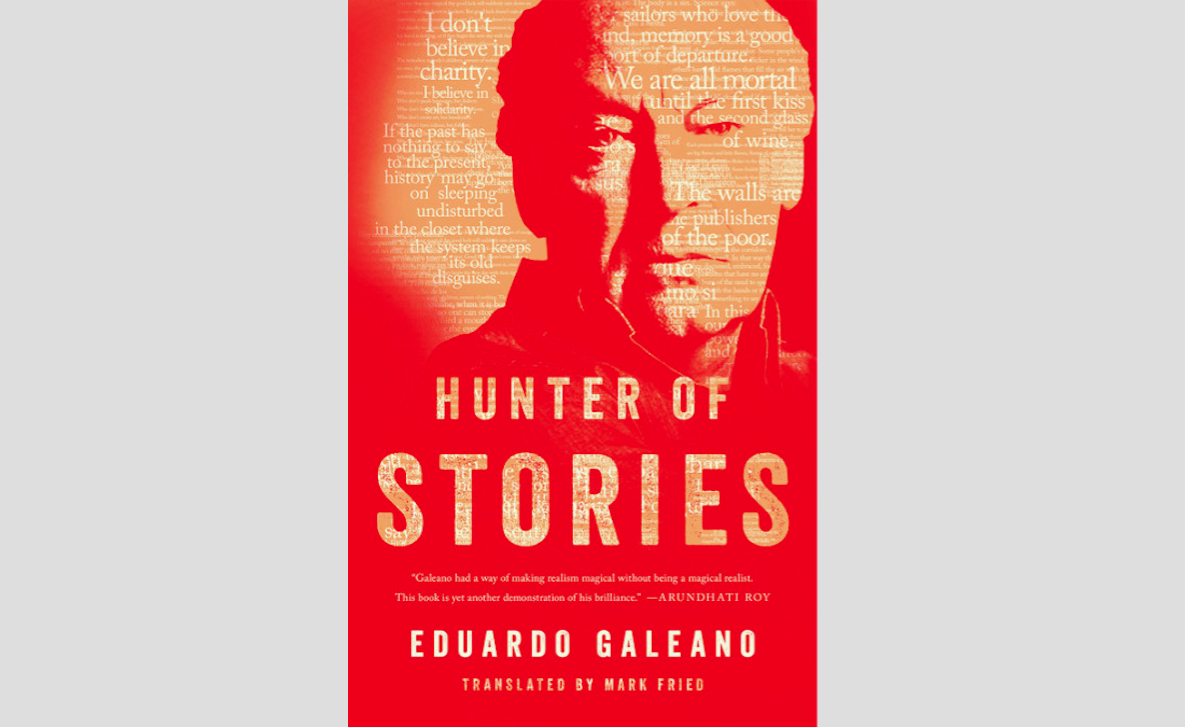On Hunter of Stories. 2017. By Eduardo Galeano. Translated by Mark Fried. Nation Books.
The late Uruguayan writer Eduardo Galeano made it his life’s mission to come up with an alternate history of Latin America, one that relied more on indigenous legends, accounts of oppression and resistance, personal memories, idle thoughts, and fictionalized accounts to inform people, as Galeano once wrote, of “certain facts that official history, history as told by the conquerors, hides or lies about.”
And through the decades, in book after book—which he cranked out with an enviable regularity right up till his death from lung cancer in April 2015—Galeano’s style remained remarkably consistent, even in his occasional forays into his other great passion, soccer. He wrote in short vignettes that rarely surpassed a printed page in length, strung together often with the most tenuous of connections. Some passages explode off the page with beauty or humor or thought-provoking sadness, while others clank because they are pretentious or preachy or obvious.
The posthumous Hunter of Stories (published in 2016 by Spanish press Siglo XXI, and translated into English by Mark Fried for Nation Books) is fairly typical of Galeano’s hit-and-miss style. He draws on sources as far-flung as Saint Columba rowing across Loch Ness, the conviction on charges of genocide of former Guatemalan president Efraín Ríos Montt, how the U.S. conducts air wars with drones, and a Bolivian legend of how armadillo shells came to be used for the stringed musical instrument called the charango, to create a collection that is, in turns, elliptical and evocative, then snarky and infuriating. At its worst, it is altogether simplistic.
The pieces tend to misfire more frequently than those in, say, Memory of Fire, his 1980s three-volume masterpiece. One, headlined “Rain,” reads, in its entirety:
“Among all the world’s music and all heaven’s too, my favorite is the concerto for solo rain.
Every time it plays on the skylight of my house, I listen as if I were at Mass.”
Which does not mean that fans won’t find things here to admire, like the story about a Spanish poet who asks a distinguished older woman he encounters on the streets of Stockholm, “Aren’t you Greta Garbo?”
“I was,” she replies distantly.
And Galeano’s gimlet eye for hypocrisy and irony never left him. In one vignette, he marvels at how “the man who burned the most books and read the fewest” nevertheless put together the largest library in Chile—the President Augusto Pinochet Ugarte Library at the Academy of War in Santiago.
In many ways, Hunter of Stories seems like a missive from an era recently passed. When Galeano died, the so-called “pink tide” still dominated Latin American politics. Cristina Fernández de Kirchner and Dilma Rousseff were the embattled-but-defiant presidents of Argentina and Brazil, respectively; Fidel Castro was alive and occasionally opining on how best to preserve the Cuban revolution; and Nicolás Maduro’s United Socialist Party of Venezuela (PSUV) had yet to lose control of the congress and resort to its most blatant authoritarian tactics.
And Galeano’s most influential work, Open Veins of Latin America (1971)—which was banned by a number of right-wing governments, including that of Uruguay (Galeano lived in exiled from 1973 to 1985, first in Argentina and later Spain)—has made a habit of unexpectedly cropping up in recent years.
In 2009, Venezuelan President Hugo Chávez gave Barack Obama a copy, catapulting the book to the top of best-seller lists. (The writer returns the favor in Hunter of Stories, relating how as a child Chávez sold his grandmother’s candied papaya strips—which they called “spiders” for some forgotten reason—on the streets of Sabaneta.) And, then, a year before Galeano’s death, the writer said that he could no longer recognize himself in Open Veins.
“Reality has changed a lot, and I have changed a lot,” he told an audience at a book fair in Brazil.
Conservatives throughout Latin America seized upon his statements as a repudiation of the book’s anti-capitalist, anti-colonial message, a sentiment that he subsequently denied.
But it’s tempting to argue that Galeano helped give birth to and now terminate the most socialist period in Latin American history; there is a satisfying symmetry in thinking of Hunter of Stories as a eulogy for the pink tide.
But that would be extremely arbitrary.
For all Galeano’s artful exploration of Nahuatl and Mayan and Tiwanaku legends and senseless colonial oppression, his life’s work, that reconstructed Latin American history, remains unconvincing. In part because the thing his works reveal, resoundingly and entertainingly, is how all histories—even, or maybe especially official ones—are concocted out of little more than myth and tissue paper and the memory of fire.


